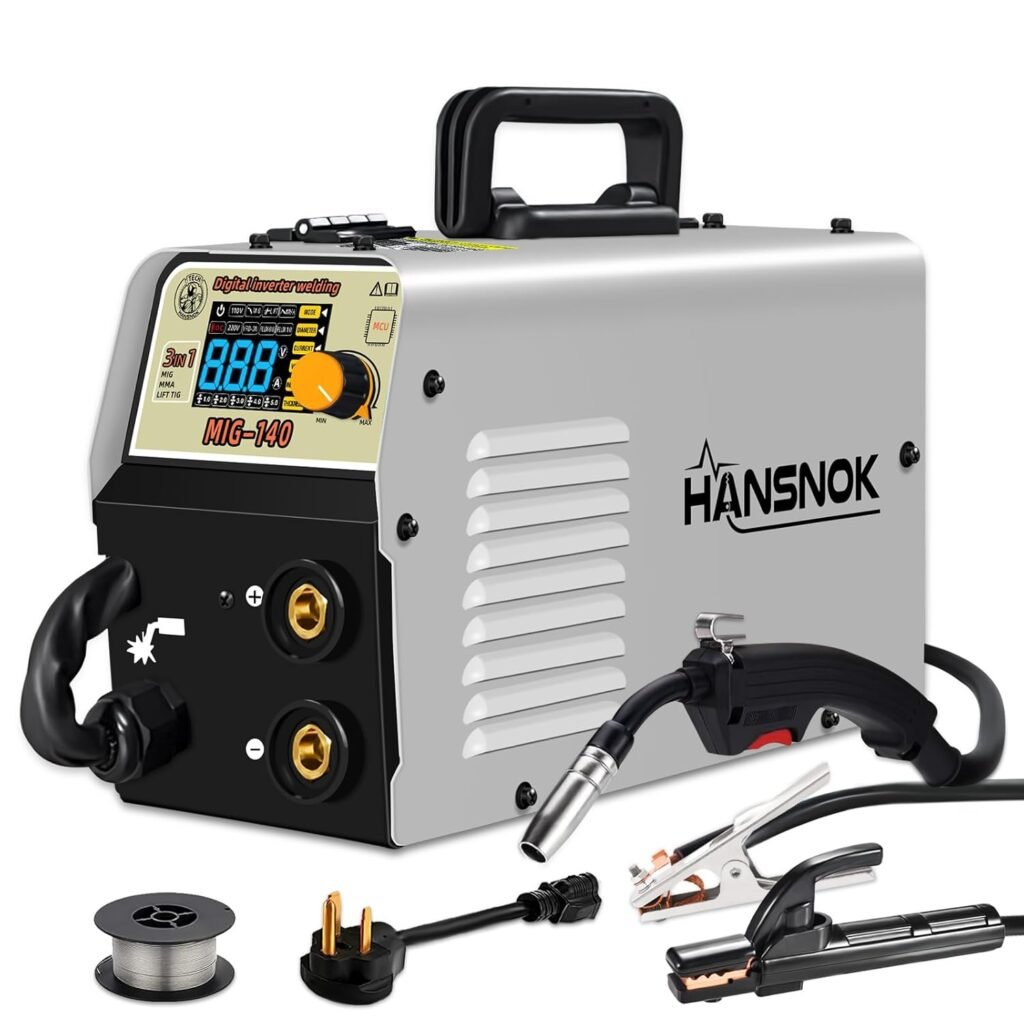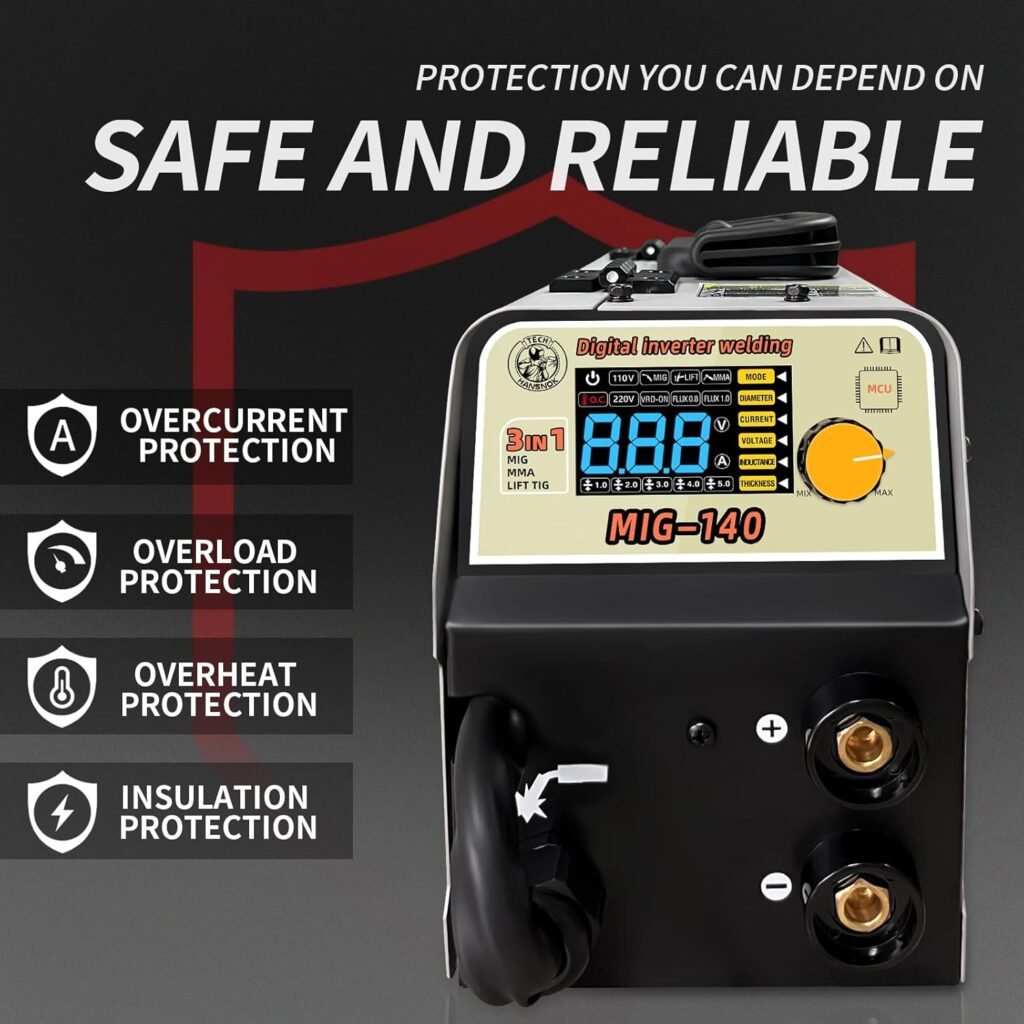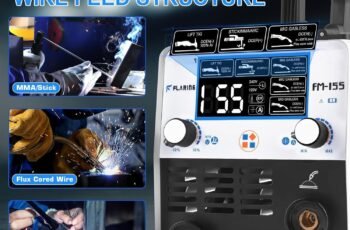Ad Blocker Detected
Our website is made possible by displaying online advertisements to our visitors. Please consider supporting us by disabling your ad blocker.
?Are you trying to decide whether the HANSNOK 140A MIG Welder, 110V/220V Flux Core MIG Welder/Lift TIG/Stick 3 in 1 Welding Machine with Synergy, IGBT Inverter Portable Gasless Welder Equipment with Welding Gun (MIG-140) is the right fit for your projects?
Quick Verdict
You’ll get a compact, multi-function welder that packs a surprising amount of capability into a light and portable package. It’s aimed squarely at hobbyists, DIYers, and small shops that need a flexible machine for light to medium jobs rather than heavy industrial duty.
Key Features
You’ll appreciate the combination of MMA (stick), Lift TIG (torch not included), and flux-cored MIG modes in one machine. The HANSNOK MIG-140 includes a digital LED screen, IGBT inverter technology, automatic protections, and a low weight that makes it easy to bring to jobs.
Main specifications at a glance
You want a clear snapshot so you can compare quickly, and this table gives an easy breakdown of the most important specs you’ll reference while shopping.
| Specification | Detail |
|---|---|
| Model | HANSNOK 140A MIG Welder (MIG-140) |
| Welding Modes | MMA (Stick), Lift TIG (torch not included), Flux Core MIG (gasless) |
| Input Voltage | 110V / 220V (dual voltage capability) |
| Max Output Current | 140 A |
| Flux Core Wire Sizes | .030″ (0.8mm) & .035″ (1.0mm) |
| ARC Rods | Supports E6013 (and similar) |
| Duty Cycle | Manufacturer does not publish a detailed duty cycle specification |
| Controls / Display | Intelligent LED screen for easy current parameter reading |
| Protections | Automatic compensation for voltage fluctuations, over-current, overload, overheating |
| Cooling | Auto fan function |
| Torch Included | MIG welding gun included; Lift TIG torch not included |
| Weight | Approximately 10 lbs |
| Technology | IGBT inverter, synergy function |
You’ll find that listing these specs helps set realistic expectations about what this machine can handle. The table makes it quicker to compare with other compact welders you might be considering.
Multi-functionality (MMA / Lift TIG / Flux MIG)
You’ll like having three welding processes available from a single unit because it reduces the number of machines you need. The combination gives you the versatility to work on mild steel panels, perform light TIG-style welds with a Lift TIG torch (sold separately), and use flux-cored wire for gasless MIG welding outdoors.
What that means for your projects
If you switch between vehicle bodywork, small fabrication, and home repairs, you’ll find the ability to change processes useful. You can use flux core for quick outdoor welds, MMA for thicker rod-style repairs, and lift TIG for more precise bead control when you add a TIG torch.
Power & Safety
You’ll notice the machine is rated up to 140A, which is adequate for welding mild steel up to roughly 3.0 mm (about 1/8″). It includes several safety features designed to protect both you and the machine from common electrical and thermal issues.
Thermal and overload protection
You’ll have an auto fan and built-in overload/overheat protection so the unit shuts down or cools itself when temperatures get high. This helps prevent damage from extended use and gives you a modest level of reliability when you need to work for longer sessions.
Wire & Electrode Compatibility
You’ll be able to use common flux core wire sizes, specifically .030″ (0.8 mm) and .035″ (1.0 mm), which are widely available. For stick welding, the unit accommodates rods like E6013, which are popular for their ease of use and forgiving arc characteristics.
Practical implications for sourcing consumables
You’ll find it easy to buy recommended wire and rods at hardware stores or online, and using standard consumables helps keep your running costs predictable. If you plan on TIG often, remember that the Lift TIG torch is not included, so you’ll need to source that separately.
Intelligent LED Screen
You’ll appreciate the intelligent LED screen that shows output current and lets you adjust settings without removing your helmet. The display is designed to be clear and user-friendly, making quick changes possible while you’re working.
Why the display matters
You’ll be able to monitor and tweak current for different metals and thicknesses, which improves weld consistency. The screen’s larger field of view and clarity is a small but meaningful convenience for steady, controlled welding.
Protection & Cooling
You’ll get a machine that actively manages voltage fluctuation and provides protections for over-current and overload. The auto fan kicks on when internal temperature rises, which saves energy and reduces noise during light use.
How these protections affect real-world use
You’ll be less likely to face unexpected shutdowns or component damage in variable jobsite conditions. If you work outdoors and encounter unstable power, the auto voltage compensation and protections reduce risk.
Portability & Weight
You’ll be able to carry the unit with one hand—at about 10 lbs it’s genuinely portable compared with many bench welders. Its compact form factor means you can store it in a small corner of your garage or take it to a remote jobsite without a truck.
What portability enables for you
You’ll be more inclined to bring the welder to the workpiece rather than bringing the workpiece to your shop. That flexibility is ideal for bodywork, mobile repair, or projects where access is limited.
Performance in Real-World Welding
You’ll want to know how it actually performs on metal, and while this is not a heavy industrial machine, it’s well-suited to light fabrication, automotive sheet metal, and home repairs. The inverter technology provides a stable arc for flux core and stick welding within the machine’s capability.
General feel and arc stability
You’ll likely notice a consistent arc and reasonable puddle control for flux core wire and E6013 rods. The machine’s IGBT inverter contributes to smoother arc characteristics and efficient power usage compared with older transformer-based models.
MIG Performance (Flux Core)
You’ll use flux-cored welding for convenience outdoors or when shielding gas isn’t practical. The units that fit .030″ and .035″ wire produce controllable beads on thin to moderately thick mild steel.
Practical tips for good MIG flux-core welds
You’ll want to tune wire speed and current to match material thickness and joint preparation. Make sure you clean the weld area of rust, paint, and oil for better fusion and reduced spatter.
MMA (Stick) Performance
You’ll find stick welding useful for thicker sections and for working in windy or dirty environments. The HANSNOK’s ARC mode accommodating E6013 rods is a practical choice for general maintenance and repair.
Handling stick technique and limitations
You’ll see that E6013 rods are forgiving and easy to strike for beginners, but if you need high-penetration stick welding for heavy fabrication, you may run into the limits of the 140A max output.
Lift TIG Capability
You’ll be able to perform Lift TIG when you attach a compatible torch (not included), which is handy for more precise or cosmetic welds. Lift TIG requires a touch-and-lift arc start and is suitable for thinner metals where bead control is important.
What to keep in mind for TIG users
You’ll require a TIG torch and appropriate gas/consumables (if you need real TIG behavior beyond lift start) depending on your goals. Remember this machine’s TIG is a basic Lift TIG implementation rather than a full-featured professional TIG unit.
Duty Cycle & Thermal Management
You’ll want to manage expectations since the manufacturer doesn’t publish a formal duty cycle, and the machine’s size suggests a modest duty capability. The auto fan and overload protection help, but sustained high-amperage work will probably push the unit into thermal protection more quickly than a larger shop welder.
How to work around duty cycle limits
You’ll get better longevity by welding in shorter bursts and allowing the machine time to cool between heavy welds. For intermittent hobbyist and repair work, that’s usually sufficient, but for repeated long runs, consider a heavier-duty option.
Usability & Controls
You’ll find the controls straightforward, especially with the LED screen to guide current settings. The synergy functionality aims to simplify getting into the right range for typical projects by suggesting pre-set values or automatically compensating certain parameters.
Setup & Synergy Function
You’ll be able to set up quickly thanks to the synergy approach, which reduces the number of adjustments you have to manually configure. This is particularly helpful if you’re newer to welding and don’t want to guess ideal settings for wire speed vs. current.
Adjustability & Fine-tuning
You’ll still have enough control to fine-tune for edge cases and special materials, so you aren’t stuck with overly simplified settings. The intuitive interface means you can experiment with small adjustments to get the bead appearance and penetration you prefer.
Torch & Accessory Compatibility
You’ll receive a MIG welding gun but not a Lift TIG torch, which means you’ll want to budget for the TIG torch if Lift TIG is important for you. Accessories like spare contact tips, drive rolls sized for .030/.035 wire, and proper clamps are standard things you’ll want on hand.
Build Quality & Design
You’ll notice a compact and utilitarian exterior that focuses on function over frills. The chassis and connectors appear built to the expectations for economy inverter welders, and the IGBT inverter technology inside is a modern choice for efficiency and weight savings.
Chassis & structural elements
You’ll see a light yet rigid shell that protects internal components and provides mounting points for the handle and connections. The light weight is a clear trade-off against industrial robustness, but for mobile and hobby use it’s a major convenience.
Cooling & internal components
You’ll rely on an automatic fan to keep temperatures in check, and the machine includes basic thermal protections for the inverter electronics. The internal layout leans toward serviceability; however, deep repairs may require professional assistance or warranty service.
Who Should Buy It
You’ll be considering this welder if you want a portable, versatile machine that handles a broad set of home and hobby welding tasks. It’s well-suited if you value portability and multifunctionality more than industrial-level throughput.
Hobbyists & DIYers
You’ll find this machine ideal if you’re tackling weekend projects, auto body patchwork, home metal furniture, and light fabrication. The combination of MIG, MMA, and Lift TIG lets you try different techniques without buying multiple expensive machines.
Small Shops & Light Fabrication
You’ll see value in small shops that do occasional mobile repair or limited production runs where heavy duty continuous welding isn’t required. The dual-voltage feature gives you flexibility for different power environments.
Not Ideal For…
You’ll want to avoid this for production shops that run sustained high-amperage welding all day. If you need a machine for thick-plate structural welding or high-duty-cycle industrial work, you’ll be better served by a larger, dedicated MIG or TIG machine with a specified duty cycle suitable for your workload.
Pros & Cons
You’ll appreciate the clear strengths and limitations when making a decision; below are the main positives and trade-offs to consider.
Pros
- You’ll like the 3-in-1 multifunctionality, which reduces the need for multiple machines.
- You’ll enjoy the portability; at roughly 10 lbs it’s easy to take to jobs.
- You’ll benefit from IGBT inverter efficiency and an intelligent LED screen that simplifies adjustments.
- You’ll be protected by auto fan, over-current, overload, and voltage compensation features.
- You’ll find it compatible with common flux-core wires and common stick electrodes.
Cons
- You’ll need to buy a Lift TIG torch separately if you want TIG capability.
- You’ll be limited by the machine’s maximum output (140A) for thicker metals.
- You’ll not have a manufacturer-provided duty cycle to precisely plan heavy workloads.
- You’ll likely run into duty and thermal limits during prolonged high-amperage use.
Comparison With Similar Machines
You’ll find that the HANSNOK MIG-140 sits in a crowded field of affordable inverter welders offering multi-process functionality. It competes well on price and portability but may lack the duty cycle transparency and accessory package of some competitors.
Vs Other 140A Portable Welders
You’ll probably see similar arc characteristics and limitations in other 140A inverter welders. Where HANSNOK stands out is the synergy function, LED screen clarity, and very light weight, while others may offer bundled TIG torches or more detailed duty cycle claims.
Vs Dedicated MIG or TIG Machines
You’ll notice that a dedicated MIG machine will generally provide higher duty cycles, more stable wire feed for heavy production, and often a broader set of named features like spool gun compatibility. You’ll find dedicated TIG machines give much better arc control, AC capability for aluminum, and finer pulse control which this combo unit doesn’t aim to replace.
Maintenance & Troubleshooting
You’ll want to follow a modest maintenance regimen to keep this unit reliable—clean fans, check cable connectors, and keep consumables fresh. Troubleshooting is usually straightforward thanks to modern inverter design, but some issues may require vendor support or warranty service.
Routine Maintenance
You’ll clean dust and metal particulate out of vents, check the condition of leads, and inspect wear parts like contact tips and drive rolls. You’ll also want to keep a schedule for checking grounding clamps and electrode holders for corrosion or loose connections.
Common Issues & Fixes
You’ll occasionally see wire feed issues, inconsistent arc, or thermal shutdowns. You’ll fix these by swapping contact tips, adjusting drive roll tension and alignment, cleaning the feed mechanism, and allowing the unit to cool if thermal protection engaged. If electrical faults persist, consult customer support.
Safety Tips & Best Practices
You’ll always prioritize safety—use proper PPE (helmet, gloves, jacket), ensure adequate ventilation, and ground your work properly. You’ll also follow recommended cable routing, keep flammable materials away, and adhere to safe power hookups for dual-voltage operation.
Practical safety precautions
You’ll double-check your input voltage selection and plug type before powering up since the unit supports both 110V and 220V operation. You’ll also use an appropriately rated extension cable and avoid undervalued cords that cause voltage drop and overheating.
Accessories You Should Consider
You’ll likely want a small kit of spare consumables and tools: extra contact tips and nozzles for the MIG gun, drive rolls sized for .030″/.035″, additional E6013 rods, a proper Lift TIG torch if you plan to TIG often, and a quality welding helmet with adjustable shade.
Helpful add-ons for better results
You’ll find a chipping hammer, wire brush, clamps, a welding cart, and a magnetic holder make your workflow smoother. You’ll also consider purchasing a heavier-duty ground clamp or longer leads if you routinely weld in tight or remote areas.
Price & Value Considerations
You’ll evaluate the HANSNOK MIG-140 based on how much flexibility and portability you need versus your welding volume. For a modest price, you’re getting three processes in a lightweight package with modern inverter controls and protections, which is compelling for budget-conscious buyers.
Is it worth it for you?
You’ll get excellent value if you’re a hobbyist, a mobile repairer, or a small shop with intermittent welding needs. You’ll want to weigh that against the lack of a TIG torch and limited high-amperage capability if your work frequently goes beyond thin to medium gauge steel.
Real-World Use Cases
You’ll find this machine useful for vehicle bodywork, metal art, fence and gate work, small fabrication, and home repair tasks. It’s also a solid backup unit for professionals who sometimes need to work off-site with a lightweight tool.
Typical jobs you can handle comfortably
You’ll be able to weld mild steel up to about 3.0 mm effectively, perform repairs on sheet metal panels, and handle light structural tack welding. You’ll notice the flux-core MIG mode is particularly handy outdoors, where shielding gas would be impractical.
Warranty & Support Expectations
You’ll want to read the exact warranty terms the seller or manufacturer offers because coverage and service options vary. You’ll also keep in mind that warranty service and parts availability are important for longevity, especially on electronics like inverters.
How to make warranty work for you
You’ll register the product if required, keep proof of purchase, and follow recommended maintenance to ensure warranty claims aren’t denied for neglect. You’ll also document any issues with photos and error descriptions when contacting support to speed up resolution.
Final Thoughts & Recommendation
You’ll be satisfied with the HANSNOK 140A MIG Welder if you need a portable, multi-process machine for maintenance, hobby work, and light fabrication. You’ll benefit from its compactness, modern inverter tech, and practical feature set—so long as you manage expectations about duty cycle and remember to buy a Lift TIG torch separately if TIG is important to you.
Who should click buy
You’ll likely click buy if you’re a DIYer, an automotive enthusiast, or a small-shop operator needing mobile flexibility without huge investment. You’ll consider other options if you require sustained high-amperage welding or a full-featured TIG setup with included torch and AC capability.
If you want, you can ask for a quick checklist to compare this machine directly against two specific competitors you’re considering, and you’ll get a tailored comparison highlighting what matters to your projects.
Disclosure: As an Amazon Associate, I earn from qualifying purchases.







